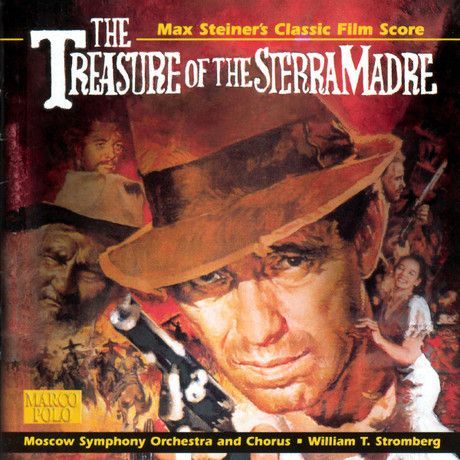The Treasure of the Sierra Madre

Label: Marco Polo
Catalogue No: 8.225149
Release Date: 8-Jan-2001
Total Duration: 60:13
UPN: 6-3694-35149-2-4
William Stromberg conducts the Moscow Symphony Orchestra
The team of conductor William T. Stromberg and score restorer John Morgan have already given film score collectors a wealth of great Golden Age soundtracks on Marco Polo Records. The Stromberg-Morgan duo have already recorded several memorable Steiner soundtracks, notably KING KONG and THEY DIED WITH THEIR BOOTS ON.
Max Steiner (1888-1971) was such a gifted and prolific film composer that it must be a difficult decision to choose what to record next. The choice of THE TREASURE OF SIERRA MADRE was an appropriate one since it is one of the composer’s best scores from his later years. Released in 1948, this excellent film starred Humphrey Bogart, Walter Huston and Tim Holt as three gold prospectors in Mexico who work together happily before greed takes over one of them. Steiner’s music reflects this growing conflict.
Instead of the usual Warner Bros. Fanfare, the score begins with the “Mountain” motif, which leads into the “Bandits” motif and then concludes with the darker “Gold” motif.” These three major themes are all introduced in less than two minutes; Max certainly didn’t waste time with his musical ideas! The second track features a snappy Mexican song, “El Desayuno,” composed by Alfonso Sanchez. Then the mountain motif returns in track 4, “The Journey Commences,” and another motif is introduced – the “Trek” theme, representing both the tenderfoots Dobbs (Bogart) and Curtin (Holt) and the seasoned old- timer, Howard (Huston). The theme will appear again and again and is probably the best remembered one in the whole score. Even though it appears throughout the film, the Trek theme is never used in exactly the same manner. Steiner shapes it to suit the drama of the film. Another major motif is introduced in track 7, “Texas Memories,” a lovely nostalgic melody played by guitars and mandolins, which also reappears several times, including in the Finale.
There are several unusual aspects to this Steiner score. One is the song, “Those Endearing Young Charms,” played on a solo harmonica by Dino Soldo on track 6. Another is the subtle use of wordless chorus in “Funeral Chant,” here performed by the Moscow Symphony Chorus. As Ray Faiola writes in his well-written CD notes: “Steiner’s choral work Is often overlooked by his assessors, but it was always employed subtly and, often, subliminally”
In addition to the full score of this Steiner classic, there are also several bonus tracks of music for the Theatrical Trailer, Alternate Main Title (with Warner Bros. fanfare) and Alternate Finale. The behind-the-scenes notes by Rudy Behlmer make fascinating reading. The same applies to Ray Faiola’s informative notes about each track. John Morgan offers his own personal remarks about arranging the film score and also meeting Murray Cutter, who was Steiner’s orchestrator in the later years. This is an outstanding release with exceptional sound, and a must for any serious film collector’s library.



